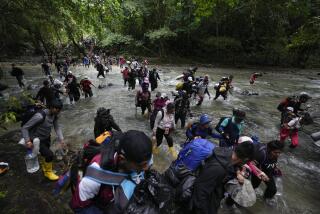U.S. Plan Tiptoes Around Nationalism
- Share via
WASHINGTON — By ordering fewer than 2,000 U.S. troops to Panama, President Bush hopes to intensify pressure on Gen. Manuel A. Noriega without touching off a nationalist backlash either in Panama or the rest of Latin America.
Administration officials said they do not expect the action to force Noriega out of power any time soon, if at all. They also acknowledged that the various steps outlined Thursday by Bush constitute a minimal response to the fraud and violence that marked Sunday’s aborted Panamanian election and its aftermath.
However, officials and non-government experts agreed that the Bush program avoids the dangers inherent in a more forceful response. The President’s plan was carefully measured to avoid feeding Latin American concern about Yankee interventionism.
Although the soldiers and Marines being sent to Panama are combat-ready, Bush made it clear that their mission is to reinforce American troops already in Panama to protect American citizens and safeguard the Panama Canal. He made it clear that the forces will not intervene directly in Panama’s political situation.
In addition, the President reaffirmed his support for the Panama Canal Treaties, which call for the United States to turn over full control of the canal to Panama at the end of this century. By rejecting the suggestions of some members of Congress that the United States abrogate the treaty, Bush avoided an action that non-government experts said would almost certainly turn public opinion in Panama against the United States.
“One must commend the President on not letting emotionalism run American policy as it did in the Reagan Administration,” said Eva Loser, a Latin American policy expert at the Center for Strategic and International Studies in Washington. “It was important not to overreact and to stay within legal boundaries. The (Noriega) regime’s propaganda machine has been charging that the United States wants to abrogate the treaty. Bush did not play into their hands.”
Latin Support Seen
Deputy Secretary of State Lawrence S. Eagleburger added in a television interview:
“The Latins are always going to be edgy about our response in the sense that they are always worried about intervention in the internal affairs of states in Latin America. In this particular case, however, I think it’s fairly clear that there is going to be almost universal condemnation of Noriega’s (election fraud), and I think we will find very substantial Latin American support for our response.”
In the past, U.S. action often has produced a nationalistic reaction throughout the region, with Latin Americans closing ranks behind nations facing a challenge from the north.
“If this is expressed in terms of the United States against Noriega, that’s a no-win situation for us,” said Wayne S. Smith, adjunct professor of Latin American Studies at Johns Hopkins University’s School of Advanced International Studies. “The lead has to be taken by the Panamanians themselves and by the other Latin American governments.”
Smith said there is not much Washington can do by itself to dislodge Noriega, short of an invasion. But he said Noriega’s position can be gradually eroded if Latin American nations join the United States in isolating Panama.
In outlining his program, Bush was careful not to promise early results. And National Security Adviser Brent Scowcroft, asked in a briefing if it would be acceptable to the United States if Noriega is still in power a month from now, replied: “I don’t see why not.”
At the same time, the Administration hinted it might take more forceful action later, with Bush saying, “If required, I do not rule out further steps.”
“This has to be a prelude to something,” said Linda Robinson, an associate editor of the prestigious quarterly Foreign Affairs and an expert on Latin America. “They have to be seriously discussing the military option at this point.”
More to Read
Sign up for Essential California
The most important California stories and recommendations in your inbox every morning.
You may occasionally receive promotional content from the Los Angeles Times.










